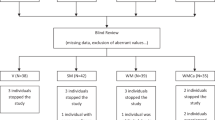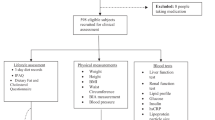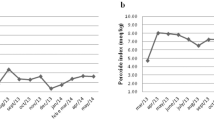Abstract
Objectives: To compare the effects of free access to reduced fat products or their full fat equivalents on fat and energy intake, body weight, plasma lipids and fat-soluble antioxidants concentrations and haemostasis variables.
Design: A multicentre open randomised controlled trial in which intervention and control groups were followed in parallel for six months. Volunteers had free access to 44 different foods either in reduced fat or full fat version, covering between 30 and 40% of energy intake. The remainder of energy intake was covered by foods bought in regular shops.
Setting: Zeist, Wageningen and Maastricht, The Netherlands.
Subjects: Two hundred and forty-one non-obese healthy volunteers who had no intention to lose weight.
Main outcome measures: Food intake, body weight, plasma lipid, vitamin E, β-carotene, lycopene and fibrinogen concentrations, plasma factor VII clotting activity, and plasminogen-activator-inhibitor-I antigen level.
Results: One hundred and three volunteers in the full fat group and 117 volunteers in the reduced fat group completed the study. Energy and fat intake from the free access products was lower in the reduced fat group, but no difference in energy and fat intake of other products occurred. Body weight, energy-, fat- and vitamin E intake and percentage of energy derived from fat decreased in the reduced fat group. No other statistical significant intervention effects were observed. Blood lipid concentrations, factor VII activity and plasminogen-inhibitor-activator-1 level were reduced after consumption of reduced fat products.
Conclusions: When subjects without intention to lose weight limit fat intake by switching from ad libitum consumption of full fat products to reduced fat products body weight gain is prevented, and fat and energy intake are reduced. Such a switch may have beneficial effects on biochemical cardiovascular risk factors. We concluded that reduced fat products will help in a population strategy aimed at preventing overweight and obesity, they will also be effective in maintaining a lower body weight after slimming. Ad libitum consumption of reduced fat products will be ineffective for those individuals that want to reduce body weight because they are currently overweight or obese.
Sponsorship: Unilever
This is a preview of subscription content, access via your institution
Access options
Subscribe to this journal
Receive 12 print issues and online access
$259.00 per year
only $21.58 per issue
Buy this article
- Purchase on Springer Link
- Instant access to full article PDF
Prices may be subject to local taxes which are calculated during checkout
Similar content being viewed by others
Author information
Authors and Affiliations
Rights and permissions
About this article
Cite this article
Weststrate, J., van het Hof, K., van den Berg, H. et al. A comparison of the effect of free access to reduced fat products or their full fat equivalents on food intake, body weight, blood lipids and fat-soluble antioxidants levels and haemostasis variables. Eur J Clin Nutr 52, 389–395 (1998). https://doi.org/10.1038/sj.ejcn.1600570
Received:
Revised:
Accepted:
Published:
Issue Date:
DOI: https://doi.org/10.1038/sj.ejcn.1600570
Keywords
This article is cited by
-
Use of artificial sweeteners and fat-modified foods in weight loss maintainers and always-normal weight individuals
International Journal of Obesity (2009)
-
Carbohydrate intake and obesity
European Journal of Clinical Nutrition (2007)
-
The Changing Environment and Population Obesity in the United States
Obesity Research (2003)
-
Are Current Health Behavioral Change Models Helpful in Guiding Prevention of Weight Gain Efforts?
Obesity Research (2003)
-
Complementary effects of Mediterranean diet and moderate red wine intake on haemostatic cardiovascular risk factors
European Journal of Clinical Nutrition (2001)



